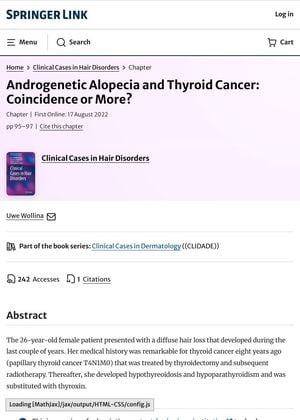TLDR The document suggests a possible link between hair loss and thyroid cancer, but doesn't provide definite proof.
The document presents a case of a 26-year-old female patient who developed diffuse hair loss over a few years. Her medical history includes thyroid cancer (specifically, papillary thyroid cancer T4N1M0) eight years prior, which was treated with thyroidectomy and subsequent radiotherapy. Following these treatments, she developed hypothyroidism and hypoparathyroidism and was given thyroxin as a substitute. The document suggests a potential link between androgenetic alopecia and thyroid cancer, although it does not provide conclusive evidence.
24 citations
,
January 2018 in “Indian Journal of Dermatology, Venereology and Leprology” Androgenetic alopecia is mainly caused by genetic factors and increased androgen activity, leading to hair follicle miniaturization.
15 citations
,
May 2017 in “Journal of Cellular Biochemistry” The hairless protein is important for skin, hair, and may influence cancer development.
 178 citations
,
April 2017 in “Journal of The American Academy of Dermatology”
178 citations
,
April 2017 in “Journal of The American Academy of Dermatology” Minoxidil, finasteride, and low-level laser light therapy effectively treat hair loss.
 6 citations
,
December 2013 in “Journal of Dermatological Science”
6 citations
,
December 2013 in “Journal of Dermatological Science” Women with alopecia may have a higher chance of getting thyroid cancer.
 2 citations
,
June 2005 in “Clinical Oncology”
2 citations
,
June 2005 in “Clinical Oncology” A man's bald spot grew hair after starting cancer treatment with gefitinib.
 December 2014 in “Endocrinología y nutrición”
December 2014 in “Endocrinología y nutrición” The woman's rare combination of diseases suggests an unknown factor may predispose individuals to multiple endocrine diseases.
43 citations
,
July 2024 in “Nutrients” A balanced diet with essential micronutrients is crucial for healthy thyroid function.
 40 citations
,
January 2013 in “Journal of Korean Medical Science”
40 citations
,
January 2013 in “Journal of Korean Medical Science” Iron deficiency may contribute to hair loss.
 January 2008 in “Springer eBooks”
January 2008 in “Springer eBooks” Thyroid disease can cause hair loss and treating thyroid problems might help with hair disorders.







